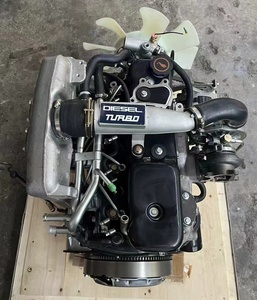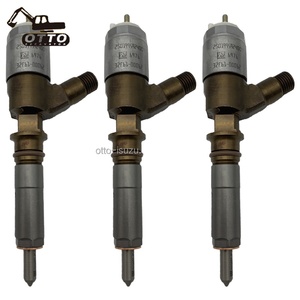(262 products available)



























































































































































































The Isuzu 4ja1 injector has different types, and they include the following:
Electromagnetic Isuzu 4JA1 diesel fuel injectors
Electromagnetic Isuzu 4JA1 diesel fuel injectors use an electromagnetic coil to open and close the injector nozzle. When the engine control unit sends a signal to the coil, it activates a magnet that pulls on a valve rod, closing the nozzle. Deactivating the coil allows spring tension to reopen the nozzle. These Isuzu 4JA1 injectors are simple, reliable, and commonly used in many diesel engines.
Piezoelectric Isuzu 4JA1 diesel fuel injectors
Piezoelectric Isuzu 4JA1 diesel fuel injectors utilize piezoelectric crystals that change shape under electrical voltage. When the engine control unit sends a signal, it activates the crystals to compress a valve rod and close the nozzle. This allows for very precise control over fuel delivery timing and amounts. Piezoelectric Isuzu 4JA1 injectors provide improved emissions, performance, and fuel efficiency but are more complex and expensive than other types.
Common rail Isuzu 4JA1 injectors
In this type, high-pressure, filtered, and de-aerated fuel is stored in a common rail, allowing multiple injectors to draw from it. This setup enables synchronized fuel delivery to all cylinders and precise timing control, reducing engine noise and emissions. The Isuzu 4JA1 common rail injectors use electromagnetic or piezoelectric actuators for nozzle opening.
Unit injector Isuzu 4JA1 diesel fuel injector
Each injector in this system combines the injector and fuel pump into a single unit. This design allows for very high fuel pressures, improving atomization and combustion efficiency. Unit injector Isuzu 4JA1 diesel fuel injectors are often used in high-performance or heavy-duty diesel engines.
Swirl chamber Isuzu 4JA1 diesel fuel injectors
These injectors are designed to introduce fuel into a pre-chamber or swirl chamber adjacent to the main combustion chamber. The injected fuel swirls in the chamber, mixing with air before entering the main chamber. This design promotes better fuel-air mixing, leading to more complete combustion and improved engine performance. These Isuzu 4JA1 diesel fuel injectors are particularly beneficial for cold-start performance and emissions control.
Details about the specifications of Isuzu 4JA1 injectors, including the flow rate and nozzle size and the pressure differential of each injector, are as follows.
Flow Rate
The flow rate of the Isuzu 4JA1 diesel common rail injector refers to the amount of fuel delivered by the injector per minute. The flow rate is measured in liters per hour (L/h) or cubic centimeters per minute (cc/min). Different engine models may use injectors with different flow rates to meet specific fuel requirements. For example, an Isuzu 4JA1 engine injector may have a flow rate of 600 L/h or 100 cc/min. This means that the injector can deliver 600 liters of fuel per hour or 100 cubic centimeters of fuel per minute. The flow rate of the diesel injector can affect engine performance, fuel efficiency, and emissions. Higher flow rates usually result in more power output but can also lead to increased emissions and reduced fuel economy.
Nozzle Size
The nozzle size of the Isuzu 4JA1 diesel injectors refers to the diameter of the openings through which fuel is sprayed into the combustion chamber. The nozzle size is usually expressed in micrometers (μm) or millimeters (mm). For instance, an Isuzu 4JA1 engine may have injectors with a nozzle size of 100 μm or 0.1 mm. This means that the openings in the injector nozzles are 100 micrometers in diameter. The nozzle size can influence the fuel atomization process, which affects combustion efficiency and emissions. Smaller nozzle sizes generally result in better atomization and more complete fuel combustion, leading to lower emissions. However, smaller nozzles may become clogged more easily, resulting in reduced engine performance and increased emissions.
Pressure Differential
The pressure differential of the Isuzu 4JA1 diesel fuel injectors refers to the difference in pressure between the fuel rail (where fuel is supplied at high pressure) and the injector nozzle. This pressure differential is crucial for controlling the flow of fuel through the injector and ensuring accurate fuel metering. The pressure differential is typically measured in bars (1 bar = 100 kPa) or pounds per square inch (psi). For example, an Isuzu 4JA1 diesel engine may require a pressure differential of 200 bars or 20,000 psi across the injectors. This means that there is a difference of 200 bars or 20,000 psi between the fuel rail and the injector nozzle openings. A higher pressure differential results in a faster fuel flow rate through the injector and can lead to more precise fuel delivery control. As a result, the engine's power output, fuel efficiency, and emissions can be optimized.
Maintaining the Isuzu 4JA1 fuel injectors in good condition is essential to ensure optimal engine performance and fuel efficiency. Here are some general maintenance tips:
When choosing Isuzu 4JA1 injectors, business buyers should consider the following factors:
Compatibility
Ensure the Isuzu 4JA1 diesel injectors are compatible with the engine's specifications. Take into account the engine model, variant, and any modifications done to the engine to get the optimal performance.
Quality and Reliability
This involves sourcing the Isuzu 4JA1 injectors from reputable suppliers and manufacturers. The brands should have a proven track record of providing quality and reliable components. This is because quality fuel injectors guarantee consistent performance and durability.
Warranty and After-Sales Support
Buyers should consider the availability of warranty and after-sales support. Suppliers should offer a reasonable warranty period to protect against possible defects. Additionally, buyers should consider the availability of after-sales support such as technical assistance and product support.
Price and Value
Business buyers should compare the prices of different suppliers and manufacturers. They should not settle for the cheapest offer but rather look for value for money. This is because the most expensive offer might not provide value for money.
Supplier Reputation
Buyers should research the suppliers' reputation. They should go through customer reviews and testimonials to get a better picture of the suppliers' reliability and product quality.
Performance and Specifications
Business buyers should choose Isuzu 4JA1 diesel fuel injectors that meet their performance needs and specifications. This includes factors such as fuel atomization, injection timing, and flow rates.
Application
Buyers should choose Isuzu 4JA1 injectors suitable for their specific vehicle applications. This includes considering factors such as vehicle type, load requirements, and operating conditions.
Upgrades and Modifications
If the injector needs upgrades or modifications to increase performance, buyers should consider it. This includes selecting injectors with higher flow rates and better fuel atomization to match the upgrades.
Environmental Regulations
Business buyers should comply with environmental regulations. This is by choosing Isuzu 4JA1 fuel injectors that meet emission standards and regulations set by the relevant authorities.
Maintenance and Serviceability
Buyers should consider the ease of maintenance and serviceability of the injectors. It is advisable to choose Isuzu 4JA1 injectors that are easy to install, remove, and maintain. This helps minimize downtime and reduce maintenance costs.
Fuel Quality
Business buyers should consider the availability and quality of fuel to be used with the chosen injectors. Some injectors may be designed for specific fuel types, such as diesel with a high cetane rating or biodiesel blends.
Replacing Isuzu 4ja1 injectors can be a complex task, but with the right tools, knowledge, and DIY skills, it can be managed. Here is a step-by-step guide on how to replace Isuzu 4ja1 injectors:
Gather the necessary tools and materials:
Prepare the work area:
Ensure the vehicle is parked on a level surface and the engine is cool. Disconnect the battery by removing the negative (-) cable to prevent electrical accidents. Set up a clean work area and gather all necessary tools and materials.
Remove any components obstructing access to the fuel injectors. This may include the engine cover, intake manifold, or fuel rail. Use the appropriate socket wrench to remove these components and keep track of their fasteners.
Carefully disconnect the fuel lines from the fuel rail using a fuel line disconnect tool. Be cautious as there may be residual fuel pressure in the lines. Have shop towels or rags ready to catch any fuel that may leak out.
Remove the fuel rail by unscrewing it from the engine block. The fuel rail holds the fuel injectors and supplies fuel to them. Once the fuel rail is removed, the injectors may be accessible.
Use a socket wrench or ratchet to remove the old injectors from their respective cylinders. They are usually secured with bolts or clips. Take note of their arrangement and order for installing the new injectors.
Before installing the new Isuzu 4ja1 injectors, clean the injector ports in the engine block using a clean rag or shop towel. This ensures a proper seal and prevents debris from entering the engine.
Lubricate the new injector seals and O-rings with a small amount of clean engine oil. This helps with easier installation and ensures a proper seal. Carefully insert the new injectors into their respective ports. Make sure they are seated properly and aligned correctly.
Reinstall the fuel rail and secure it with bolts or clips. Reconnect the fuel lines to the fuel rail, ensuring they are tightened securely to prevent leaks. Reinstall any other components that were removed, such as the engine cover and intake manifold.
Reconnect the negative (-) cable to the battery. Start the engine and check for any fuel leaks around the injectors and fuel lines. If any leaks are detected, immediately turn off the engine and recheck the connections.
Q1: What does the Isuzu 4JA1 engine represent?
A1: The Isuzu 4JA1 engine is a commonly used internal combustion engine in Isuzu vehicles. It is a 4-cylinder engine with a displacement of 2.8 liters. The Isuzu 4JA1 engine is known for its durability and reliability, making it suitable for various applications, including commercial vehicles and trucks.
Q2: How can any business buy Isuzu 4JA1 injectors?
A2: To purchase Isuzu 4JA1 injectors, businesses can follow these steps: Determine the required specifications, such as injector size and compatibility with the engine. Research and contact suppliers or manufacturers specializing in diesel fuel injectors. Request quotes and compare prices and terms. Place an order and arrange for delivery or pickup.
Q3: How many fuel injectors does the Isuzu 4JA1 engine have?
A3: The Isuzu 4JA1 engine typically has one fuel injector per cylinder, totaling four fuel injectors. These injectors atomize the fuel and deliver it into the combustion chambers for efficient fuel-air mixing and combustion.
Q4: What are the common problems with Isuzu 4JA1 diesel injectors?
A4: Common issues include clogging or leakage, leading to rough engine performance, decreased fuel efficiency, and increased emissions. Other problems may arise from injector wear or failure, affecting the atomization of fuel and causing engine misfires or loss of power. Additionally, carbon buildup can result in reduced injector performance over time.
Q5: What are the maintenance tips for the Isuzu 4JA1 diesel injectors?
A5: To ensure optimal performance and longevity, keeping the fuel system clean and using high-quality fuel is essential. Regularly changing the fuel filter prevents contaminants from reaching the injectors. Additionally, adhering to the recommended maintenance schedule for engine oil and filter changes reduces stress on the injectors. Moreover, periodic inspections can help identify early signs of injector problems, enabling timely interventions.